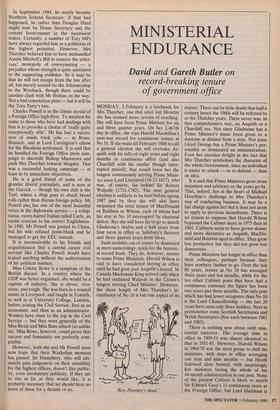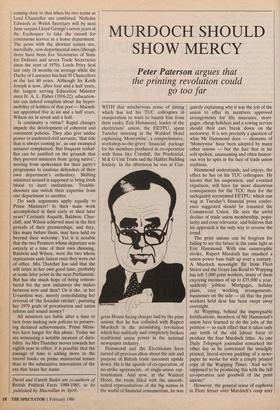MINISTERIAL ENDURANCE
David and Gareth Butler on
record-breaking tenure of government office
MONDAY, 3 February is a landmark for Mrs Thatcher, one that since last Monday she has seemed more certain of reaching. She will have been Prime Minister for six and three quarter years. On her 2,467th day in office, she tops Harold Macmillan's post-war record for continuous tenure at No 10. If she waits till February 1988 to call a general election she will overtake As- quith with his tally of eight years and eight months in continuous office (and also Churchill with his similar though inter- rupted period); that would leave her the longest continuously serving Prime Minis- ter since Lord Liverpool (18-12-1827), who was, of course, far behind Sir Robert Walpole (1721-1742). The next general election is unlikely to be held before spring 1987 and by then she will also have surpassed the total tenure of MacDonald or Baldwin or Wilson, each of whom had his stay at No 10 interrupted by electoral defeat. But she will have far to go to match Gladstone's twelve and a half years from four turns in office or Salisbury's thirteen and three quarter years from three.
Such statistics can of course be dismissed as mere numerology, trivia for the historic- al record book. They do, however, matter to some Prime Ministers. Harold Wilson is said to have considered staying in office until he had gone past Asquith's record. In Canada Mackenzie King retired only when he had outlasted Walpole as the Crown's longest serving Chief Minister. However, the sheer length of Mrs Thatcher's in- cumbency of No 10 is but one aspect of its Roy Plornley's dead.' impact. There can be little doubt that half a century hence the 1980s will be referred to as the Thatcher years. There never was, in that comprehensive way, an Asquith or a Churchill era. Not since Gladstone has a Prime Minister's name been given to a doctrine as distinct from a style. Not since Lloyd George has a Prime Minister's per- sonality so dominated an administration. Even her enemies delight in the fact that Mrs Thatcher symbolises the character of the whole Government, since an individual is easier to attack — or to defend — than an idea.
It is said that Prime Ministers grow more impatient and arbitrary as the years go by. That, indeed, lies at the heart of Michael Heseltine's challenge to Mrs Thatcher's way of conducting business. It may be a fair charge against her but it does not seem to apply to previous incumbents. There is no reason to suppose that Harold Wilson bypassed the Cabinet more in 1975 than in 1965. Cabinets seem to have grown slower and more discursive as Asquith, MacDo- nald and Baldwin aged in office. They grew less productive but they did not grow less democratic.
Prime Ministers last longer in office than their colleagues, perhaps because they have nowhere further to go. Over the last 80 years, tenure at No 10 has averaged three years and ten months, while for the ten other Cabinet posts that have had a continuous existence the figure has been two years and three months. The only post which has had fewer occupants than No 10 is the Lord Chancellorship — the last 20 years have seen only three holders. Next in permanence come Scottish Secretaries and Welsh Secretaries (five each between 1965 and 1985).
There is nothing new about swift min- isterial turnover. The average time in office in 1905-51 was almost identical to that in 1951-85. However, Harold Wilson in 1964-70 was the most prone to shift his ministers, with stays in office averaging one year and nine months — but Heath followed close behind, with surprisingly few ministers lasting the whole of his 44-month administration in one post. None of the present Cabinet is likely to match Sir Edward Grey's 11 continuous years at the Foreign Office, but Lord Hailsham is coming close to that when his two terms as Lord Chancellor are combined. Nicholas Edwards as Welsh Secretary will by next June surpass Lloyd George's seven years at the Exchequer to take the record for continuous service in a home department. The posts with the shortest tenure are, mercifully, non-departmental ones (though there have been five Secretaries of State for Defence and seven Trade Secretaries since the start of 1979). Lords Privy Seal last only 18 months on average while the Duchy of Lancaster has had 59 Chancellors in the last 80 years. Although Sir Keith Joseph is now, after four and a half years, the longest serving Education Minister since H. A. L. Fisher (1916-22), education- ists can indeed complain about the hyper- mobility of holders of that post — Macmil- lan appointed five in six and a half years, Wilson six in seven and a half.
Is continuity a virtue? Rapid changes impede the development of coherent and consistent policies. They also give undue power to unelected civil servants, 'that tide that is always coming in', as one swamped minister complained. But frequent reshuf- fles can be justified on the grounds that they prevent ministers from 'going native', moving from spokesmen for their party's programme to cautious defenders of their own department's orthodoxy. Shifting ministers around is supposed to bring fresh blood to inert institutions. Trouble- shooters can switch their expertise from one department to another.
Do such arguments apply equally to Prime Ministers? Is their main work accomplished in their early or their later years? Certainly Asquith, Baldwin, Chur- chill, and Wilson achieved most in the first periods of their premierships, and they, like many before them, may have held on beyond their welcome. Yet it is notable that the two Premiers whose departure was entirely at a time of their own choosing, Baldwin and Wilson, were the two whose reputations sank fastest once they were out of office. Mrs Thatcher has said that she will retire in her own good time, probably at some later point in the next Parliament. But has she much hope of being remem- bered for the new initiatives she makes between now and then? Or is she, in her U-turnless way, merely consolidating her reversal of 'the Socialist ratchet', pursuing her 1979 goals of privatisation and union reform and sound money?
All ministers are liable after a time to turn from making new policies to preserv- ing declared achievements. Prime Minis- ters have longer for this phase. Today we are witnessing a notable measure of dura- bility. As Mrs Thatcher moves towards her eighth year in office, it is possible that the passage of time is adding more to the record books on prime ministerial tenure than to the substantive innovations of the era that bears her name.
David and Gareth Butler are co-authors of British Political Facts 1900-1985, to be published by Macmillan in April..















































 Previous page
Previous page